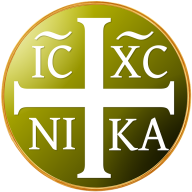The Pappas Post reported the following on February 22, 2020 under the title, Archbishop Elpidophoros of America: OK for Non-Orthodox Christian Spouses to Receive Communion.
Given the extreme seriousness of this anti-canonical and anti-ecclesiological position, the speciousness of His Eminence’s reasoning, and numerous unanswered questions—e.g., are non-Orthodox spouses free to commune in both their own denomination and the Orthodox Church, why are we allowing uncanonical mixed marriages in the first place, is marriage a “sacrament” in and of itself, unconsummated in the Eucharist, etc.?—we await a more formal statement from the Ecumenical Patriarchate or the Greek Orthodox Archdiocese on this matter.

Archbishop Elpidophoros of America
Archbishop Elpidophoros of America, head of the Greek Orthodox Archdiocese of America, declared in a public forum that Christians who have been married in the Orthodox Church but are not Greek Orthodox themselves, may receive Holy Communion.
His statement came in a question and answer session during the annual conference of Leadership 100, an organization of Greek Orthodox Church donors, which was holding its annual event in Palm Beach, Florida.
Specifically, the Archbishop was responding to a question by a member of the audience who asked why the Orthodox Church wouldn’t administer Holy Communion to non-Orthodox spouses.
The Archbishop answered the question pointedly suggesting that since a non-Orthodox spouse has already participated in a sacrament of the Orthodox Church (marriage), why wouldn’t he or she be allowed to participate in the sacrament of Holy Communion.
It is important to note that the question was specifically about non-Orthodox Christian spouses who have been married in the Orthodox Church.
According to Orthodox Church canons, only those individuals who are either baptized or chrismated into the Church can receive Communion, which the church says is the body and blood of Jesus Christ and the most important sacrament of the faith.
The current practice of the Orthodox Church— especially in pluralistic societies like the United States— allows non-Orthodox Christians, from what is called “Trinitarian” Christian traditions, to marry in the Orthodox Church. Trinitarian Christians are those who have been baptized in the name of the Holy Trinity and include Roman Catholics, most Protestants and Episcopalians.
This practice of allowing Orthodox Christians to marry non-Orthodox Trinitarian Christians in the Orthodox Church became a more prevalent practice in the United States during the leadership of Archbishop Athenagoras in the 1940s.
Throughout history and in various locations where Orthodox Christians have built communities outside of countries where Orthodox Christians are the majority, the use of “pastoral economia” or the slight bending of the rules, has been justified by the Church’s desire to prevent adverse effects from the strict observance of the law in exceptional circumstances.
Non-Christians, including those of other faith traditions like Jews, Muslims, Buddhists and others are not permitted to marry or receive Communion in the Orthodox Church.
There has been no official communique from the Archdiocese on the matter, nor a response from the Ecumenical Patriarchate of Constantinople, which not only oversees directly the Archdiocese of America, but is considered the guardian of global Orthodox Christian tradition and dogma.
This isn’t the first time the Archbishop has pushed for more church openness to non-Orthodox spouses, suggesting that mixed marriages should be considered an opportunity for the church to grow and reach more non-Orthodox.
Last October he told the Archdiocese Council that the nearly 50% of all marriages taking place in the Orthodox Church should be considered “miracle marriages,” and not “mixed marriages.”
“With this in mind, I would make this suggestion: instead of calling marriages with non-Orthodox spouses “mixed marriages,” might we not better refer to them as “miracle marriages?” For these marriages are the main road that ushers converts to the Faith,” Elpidophoros said.
“Every faithful marriage is a miracle marriage—a miracle of God’s love and a Mystery to be celebrated with joy and embraced with thanksgiving. Whether or not the spouse joins the Church in a formal way through Chrismation, they are still 100% part of our community, and should be embraced as such. If we are to be a Church that truly serves and embraces our young people who live in a technologically advanced and pluralistic world, we must embrace the strangers in our midst—make them strangers no more, and embrace all the members of our community and our Country.”


Pingback: IN CASE YOU MISSED IT: MARCH | ORTHODOXY IN DIALOGUE
Pingback: Uh-oh, the Greek Orthodox archbishop of America is a liberal - South Carolina Digital News
Pingback: Uh-oh, the Greek Orthodox archbishop of America is a liberal - Olusolacoker.com
Pingback: Uh-oh, the Greek Orthodox archbishop of America is a liberal – Arizona Digital News
Pingback: Uh-oh, the Greek Orthodox archbishop of America is a liberal - Oklahoma Digital News
Pingback: The Scotfree | Uh-oh, the Greek Orthodox archbishop of America is a liberal
Pingback: Uh-oh, the Greek Orthodox archbishop of America is a liberal – Ur1stop blog
Pingback: Uh-oh, the Greek Orthodox archbishop of America is a liberal